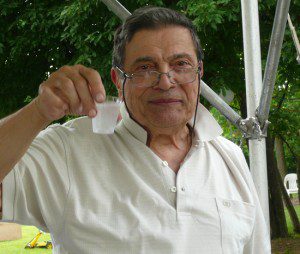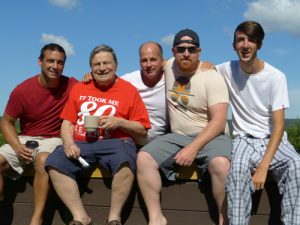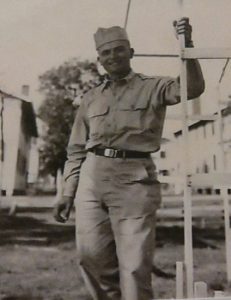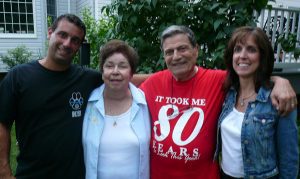
I close my eyes and all of it comes back to me. Richard Nixon had just won the U.S. Presidency, for a second term. The family gathered – either later that fall of 1972, or the following summer – from Toronto, from Maryland, New Jersey and Florida. Then, usually after the first meal together, dessert was finished, a few drinks consumed, and it was time to talk. It wouldn’t take long before current events, politics and Nixon became the focus. Within minutes there was a storm brewing.
“How could he possibly get re-elected?” my father would say.
“He’s good for business,” a couple of my American relatives would say. “He’s gonna end the war in Vietnam.”
“He’s a crook!” my father would say, looking for a verbal fight.
“He’s our president,” came the retort.
And, well, it escalated from there.
Back and forth would go the barbs, each time getting louder and more vicious. Often my mom, my aunts or my cousins would try to simmer things down. Me? I was generally as guilty as the others, wading into any political Donnybrook, just as loudly, especially when it came to politics. Generally, however, the one who saved the day was my mother’s younger brother, George Kontozoglus.
“Hey, you guys,” Uncle George would say. “You’re both right … And you’re both wrong.” And George being younger, bigger and (when he had to be) louder than any of the other verbal jousters, could generally break up the argument. And if that didn’t work, George would change the subject. Or, he’d change the venue – like from the dining room table to a game of cards or horseshoes or some other less volatile forum. Uncle George was often the comic relief, the peacemaker, the calm in the storm.

I think every family has a favourite uncle, and George has certainly been mine – and not just because he could calm the savage political beasts at our family gatherings. Among my parents, my aunts and uncles and their friends, George was the latecomer. They were born in the 1920s, he in the Depression. They served in the Second World War, he in the post-war – because of the U.S. draft – in the 1950s.

So, I guess, unlike his older peers, George saw Europe in the early stages of its recovery, when peace and reconciliation were newcomers on the global block. He also connected with us, his nieces and nephews. He had nearly as calming an influence on us.
I remember the first time my sister and I travelled with our parents to New York City, where they had grown up. Until that time in the early 1960s, however, whenever we had holidayed with relatives in the Big Apple, my sister and I had pretty much been turned over to our grandparents for entertainment and discipline. But this time was different. When we arrived, instead of the customary hugs and kisses from Yiayia and Popou (Greek for Grandma and Grandpa), there was this friendly, big-brother type guy taking charge.
“Wanna go for a ride?” George asked us. And he hustled us into his late model (early 1960s) Chrysler convertible, salmon coloured, with tail fins and a push-button transmission.
Even then our Uncle George was never one for a lot of talking. He spoke with his actions. And those actions very often worked in the nieces’ and nephews’ favour. In other words, he spoiled us rotten. Uncle George gave my sister outfits I’m sure my mom and aunts would never have discovered; they were unique. He gave me my first electric radio, and one Christmas, when I got a nearly impossible hot-rod car model to build, he patiently helped me construct it step by step. And even though Uncle George had done virtually all the work, he stepped back, quite content to watch me take credit for his model masterpiece.

But the influence of our favourite uncle didn’t end in childhood. Partly because he was closer in age to us kids and also because he married later in his life than his older siblings did, Uncle George always listened to us when others perhaps wouldn’t give the time. In his own quiet way, he offered advice when our parents’ view of things seemed a bit more arbitrary. His was probably not very different discipline than theirs, but I guess it was just a bit more calmly dispensed. He offered more mentorship than advice. (He also gave anybody who wanted one the best back rubs of anybody we know.)
A few years ago, when the family gathered for George’s 80th birthday, organized by his wife Mary and their children Ted and Kate, it was a small way for us to thank him for all those gifts he’d given us – his wisdom, his attention, his even-tempered ways.
Well, like the storm that passes, so does the calm. On Friday, after a long struggle with an array of health problems, our favourite Uncle George died. He was 86. I know my world is poorer without him, for his personality, his affection, but mostly, I think, for his sense of calm when all the world around him was flying apart.
A beautiful testimony to my godfather. – Eve Lupenko (daughter of Charlie Yeavasis)
Our deepest condolences to you and your families. May God rest his soul and may his memory be eternal. “Zoi se sas” as the Greeks say & God Bless you all xoxoxo….